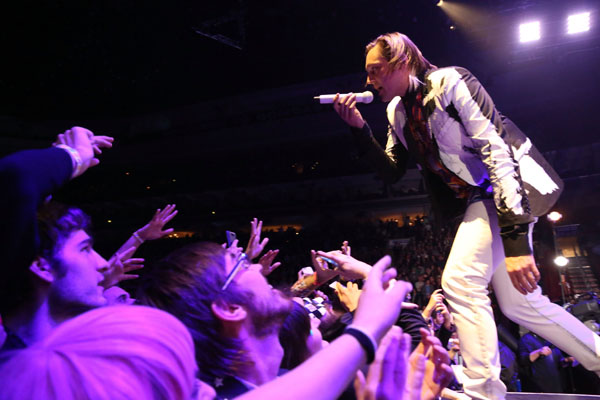Arcade Fire: Show and Post-Show in Philly

Arcade Fire
Wells Fargo Center
Philadelphia, PA
March 17
Arcade Fire arrived in Philadelphia on St. Patrick’s Day, and the two festivities collided into part-party, part-catharsis, and joyous celebration.
Rather than play a more straightforward concert, Arcade Fire have harnessed not only the power of their showmanship but the power of challenging audience perception, constantly shifting the set, positions, and dynamics of the stage. The Reflektor set bloomed gradually and shifted around, band members changed positions, and performance techniques altered according to each song. Audience members embraced it, and a sense of wonder pervaded the concert as the group, through song after song, asked the audience to ask who they were, who they are, what they want, and where they want to go.
Arcade Fire can do this because they are so damn entertaining. Frontman Win Butler has no problem jumping on speakers or into the audience, and accordionist/piano player/hurdy-gurdy player/guitar player/drummer/frontwoman/xylophone player/streamer twirler Regine Chassagne, whose versatility and stage presence enabled the shifts in musical tone and the extra dimensions to the music that make Arcade Fire so original, matches him in every way sans crowd surfing The ten-plus steam train behind them included additional horns, strings, backup vocals, and percussion, a rock-and-roll orchestra not surpassed outside of E Street.
The two-hour show, which the reviewer fears spoiling parts of by going too deeply into visual detail, consisted of most of their most loved songs and occasional glimpses of great humor. The band has been encoring some shows with hometown hits, and “Motownphilly” knocked everyone who knew it for a loop. With both the album Reflektor and their show, the band encouraged its audience repeatedly, artfully, and entertainingly not to believe everything they see — more relevant to today’s age of Internet hoaxes and click bait than perhaps any other. The band played twenty-one songs over two hours — half of Funeral, a couple from Neon Bible, a plurality of The Suburbs, and the majority of Reflektor — in a well-paced and hallucinatory trip through lyrical confrontation with the great questions of the human condition — no answers provided — to the enjoyment of an audience that finds challenge in music harder to find these days.
The after-party was a hoot, in a 550-capacity warehouse six miles away, Union Transfer. Half of Arcade Fire (Tim Kingsbury, Richard Reed Parry, Jeremy Gara, and Will Butler) emerged as a cover band called “Phi Slamma Jamma” and ran through a tight-in-the-pocket cover set and establishing themselves as a fantastic party band. Covers by The Ramones, Dylan, Prince, The Rolling Stones, Joan Jett, and The Modern Lovers followed, with the the crescendo being the unmistakable riff to “Helter Skelter” at which point Win Butler ran onto the stage and set off the room.
After the song, Butler jumped off and charged through the crowd to the DJ booth, spinning Fela, old school rap, Haitian music, and, hilariously, a mash-up of “You’re So Vain” by Carly Simon and “I Am a God” by Kanye West. Although Butler struggled with some song transitions, the crowd was dancing along and having a great time to his well-remixed four-on-the-floor beatmaking and song selection.
For a breather, Sarah Neufeld and Owen Pallett performed short, entertaining sets pushing the avant-garde of composition on violin, and the audience appreciated the challenge, even at one in the morning after St. Patrick’s Day. Members of the band talked to everyone who approached them, drank with them, and thanked them for coming. At some point, the crowd busted open a piñata shaped like an iPhone and passed the candy around to each other. At 2 am, three hours after the party had began and five hours after the band had taken the stage, Win dropped “Sabotage” and Union Transfer became a screaming and jumping mass of sweaty people lost in the moment, singing along, and ignoring their own iPhones.
No other band sells out an arena and then downs shots with its fans at a karaoke > DJ > avant-garde > piñata > DJ after show. The group is not letting its success, and its bankability, hinder its desire to challenge its listeners. Rather, Arcade Fire’s success has strengthened this desire while fostering a enduring connection with fans.



















